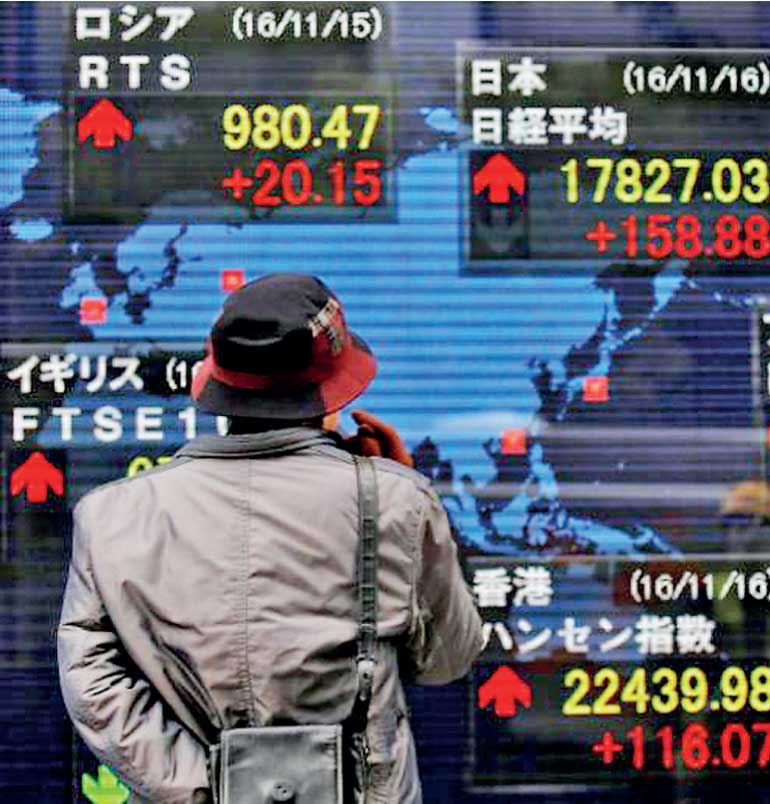Wednesday Feb 25, 2026
Wednesday Feb 25, 2026
Wednesday, 10 May 2017 00:00 - - {{hitsCtrl.values.hits}}
 SINGAPORE (Reuters): Asian stock markets edged down on Tuesday following a flat close on Wall Street, as investors searched for the next catalyst following France’s presidential election, while oil inched higher on expectations OPEC supply cuts will be extended.
SINGAPORE (Reuters): Asian stock markets edged down on Tuesday following a flat close on Wall Street, as investors searched for the next catalyst following France’s presidential election, while oil inched higher on expectations OPEC supply cuts will be extended.
Financial spreadbetters expect Britain’s FTSE 100, Germany’s DAX and France’s CAC 40 to all open flat.
The South Korean stock market, which finished at a record high on Monday, is closed for Tuesday’s presidential election.
Liberal Moon Jae-in is widely expected to win the presidency, following months of leadership vacuum after former President Park Geun-hye was removed on charges of bribery and abuse of power.
The polls opened at 6 a.m. (2100 GMT on Monday) and will close at 8 p.m. (1100 GMT). The winner is expected to be sworn in on Wednesday after the Election Commission releases the official result.
Allies and neighbors are closely watching the election amid escalating tensions over North Korea’s accelerating development of weapons since it conducted its fourth nuclear test in January last year. It conducted a fifth test in September and is believed ready for another.
North Korea would be keen to see a Moon victory. Its official Rodong Sinmun newspaper said in a commentary on Monday the time had come to put confrontation behind the Koreas by ending conservative rule in the South.
“South Korean markets had not registered significant risk-off sentiment similar to other economies pre-elections, and this is no surprise,” Jingyi Pan, market strategist at IG in Singapore, wrote in a note.
“The largely similar stance on policies by the Presidential candidates provides little chance of surprise as compared to last week’s French election. Meanwhile, the filling of the political vacuum could go a long way to benefitting the economy.”
The Korean won weakened 0.25% on Tuesday, with the dollar buying 1,135.52 won.
MSCI’s broadest index of Asia-Pacific shares outside Japan slipped 0.2% on Tuesday.
Japan’s Nikkei was slightly lower.
China’s CSI 300 index retreated 0.3% in its sixth straight session of losses amid concerns over tighter financial regulations. Hong Kong’s Hang Seng reversed earlier losses to trade up 0.35%.
Taiwan stocks pulled back to trade 0.25% lower on profit taking after earlier surpassing the 10,000-point mark to hit a two-year high.
The MSCI World index, which touched a record high overnight, dropped about 0.1%.
The dollar was flat at 113.285 yen, retaining most of Monday’s 0.4% gain.
The dollar index was also steady at 99.11.
The euro was steady at $1.0927 after tumbling 0.7% on Monday.
“The euro’s retreat was driven solely by profit-taking. I think it is going to regain momentum over time,” said Yukio Ishizuki, senior currency analyst at Daiwa Securities.
French stocks slumped 0.9% overnight, their biggest one-day loss in almost three weeks, as investors took profits following strong gains in the run-up to Sunday’s vote that saw the market favorite, centrist Emmanuel Macron, elected president.
Germany’s DAX closed 0.2% lower, while Britain’s FTSE was marginally higher.
On Wall Street, all three major indexes closed flat, holding near recent all-time highs. The CBOE Volatility Index closed at 9.77, its lowest since December 1993.
BENGALURU (Reuters): Gold prices hit their lowest in nearly eight weeks on Tuesday as safe-haven demand ebbed on easing political worries after France’s presidential election.
Spot gold was steady at $1,226.13 per ounce by 0810 GMT, after touching $1,223.34, its lowest since March 16.
The metal tested its 100-day moving average earlier in the session, but is holding above that line for the time being.
U.S. gold futures dropped 0.1% to $1,226.20 an ounce.
“With one of the largest political risk events now cleared, some consolidation is warranted, albeit political uncertainty lingers in Italy and is likely to remain for some time,” UBS analyst Joni Teves said.
“Further pressure cannot be ruled out for now, but we expect bargain hunting to emerge and physical buying to strengthen should the market test $1,200, paving the way for a recovery.”
Sunday’s vote in France saw the market favourite, centrist Emmanuel Macron, elected president.
“Overall sentiment has been turning from risk aversion to normalized risk tolerance levels, so we can see that demand for gold has been decreasing,” said Mark To, head of research at Hong Kong’s Wing Fung Financial Group.
Elsewhere, Wall Street’s volatility index , which measures implied volatility of stock options and is often seen as an investor fear gauge, closed at 9.77 on Monday, its lowest since December 1993.
“The fall of the volatility index further hollows out the safe-haven bid that has underpinned gold for most of 2017. Should volatility remain becalmed, gold may find itself on the losing end of a deeper correction to the downside,” said Jeffrey Halley, senior market analyst at OANDA.
The U.S. economy’s weak performance at the start of the year should slow Federal Reserve plans for further rate increases, St. Louis Federal Reserve bank president James Bullard said on Monday.
“Even though there may be some slowdown in economic recovery for a very short time, Fed officials still think that this does not impact the rate hike decision,” To said.
Gold, which is priced in dollars, could see demand take a hit from higher rates as it pays no interest.